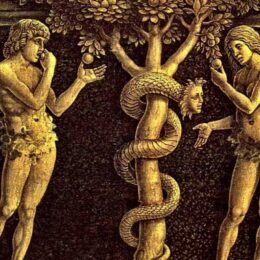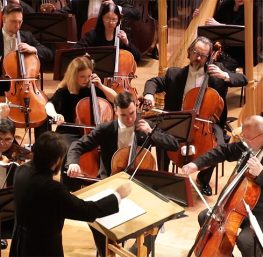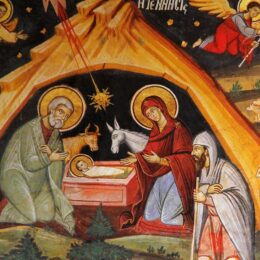 by Fr. Stephen Freeman –
by Fr. Stephen Freeman –
My previous article spoke about the “moment” and the unique place it holds within our lives. It is strange, therefore, that the present moment is a place we seem to avoid – a place we dare not go. There are many ways to speculate about such an avoidance. In the experience of many, it is a place that seems almost impossible to read – which is strange indeed when we consider the fact that it is actually the only thing truly present to us.
The present moment, however, has some unique properties in human experience that make it a place we prefer to avoid. It is not past or future – and is thus much less subject to imagination. The imagination is a place where we find ourselves empowered, though the power we have is delusional and only destructive of the self. We may play mental games with the past, imagining that the truth is whatever we think it is, and imagine our own reactions as well. Never mind the fact that our imagination is most often quite wrong and our reactions utterly beside the point. The imaginary past becomes a “new history” which takes its place in the narrative of our lives. As such, our lives become a lie. They are not the product of history – indeed they are not related at all to history – only to a story we have told ourselves for whatever advantage or disadvantage. We are neither hero nor victim, only imaginary characters in a story known only in the privacy of our own imagination.
The same, of course, is true of the future. We cannot know the future, but we can well imagine it. We experience such imagination as fear or any number of false feelings. What we cannot know cannot be feared (in reality) – it can only be imagined and our fears and expectations become the stuff of our imagination.
God is not the product of our imagination
These things are vitally important to us as Christians. God is not the product of our imagination. Because this is so, and because we rarely experience the present moment in the present moment – the God whom most people think they know is no God at all, only the imagination of past or present, one of many characters that inhabit the unreality of our unstable minds. We should not be shaken by the skepticism of those who question our thoughts and beliefs about God. We should take such skepticism as a sober encounter of the insobriety of our imaginations.
As a priest, I spend far more time helping people deal with the eradication of false images of God than I do helping them come to grips with the God who is. We are idolaters in the very deepest sense of the word – and we should be the first to acknowledge it.
This danger cannot be eliminated by artificial substitutes such as the “authority of Scripture.” Scripture is certainly authoritative, but if it is not read by a “sober” mind (in the sense of a mind that is not drunk on its own imagination) then it will simply become the occasion for more flights of fancy, fodder for the passions of an unredeemed soul, our egos enlarged beyond control.
The same can be said of the Tradition of the Church or the Writings of the Fathers. The modern Christian world, both Orthodox and non-Orthodox, is largely populated by modern imaginations. We have opinions on prayer, but we do not pray. We have opinions on God, Whom we do not know. The list could be magnified.
To renounce our fantasies of past and future and accept the reality of my present moment is exceedingly difficult.
What is required is the simple task of becoming simple. This is very hard and may even be the task of a life-time. To renounce our fantasies of past and future and accept the reality of my present moment is exceedingly difficult. It requires the renunciation of power. It requires the renunciation of false Gods (ourselves among them). It requires the discipline of a careful life of watchfulness (nepsis – also translated sobriety), and the willingness to be frequently brought up short – the discipline of learning to be wrong without complaint.
Oddly enough, God does not deny us such wonderful opportunities for salvation. Our daily lives frequently contradict our imaginations – though we refuse such obvious rebukes. Our relationships with others, whether in marriage, work, family or elsewhere also bring us the same opportunity. The wonderful mystery of confession allows us to speak the truth about the nonsense of our imaginations and have it brought face-to-face with the reality of God. In the presence of a good confessor, such an encounter is powerful indeed.
We should never discount the siren song of past and future that fills our soul. It is the song of the devil and calls us to a world that does not exist, into a version of ourselves that does not exist, with a notion of a God who does not exist. In such places we are actually powerless, despite the imagination of power. As the prayers of the Church describe it, we become “the devils plaything.”
The true God is kind enough to meet us in the present – where He is only what He is – and we are only what we are. On this common ground “like calls unto like” and we find ourselves – our true selves – and find them in the true God. Now. Here. Present.



